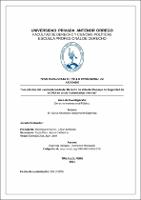| dc.contributor.advisor | Espinola Otiniano, Diomedes Hernando | |
| dc.contributor.author | Bustamante Espinoza, Dana Alexandra | |
| dc.creator | Bustamante Espinoza, Dana Alexandra | |
| dc.date.accessioned | 2021-08-26T20:55:43Z | |
| dc.date.available | 2021-08-26T20:55:43Z | |
| dc.date.issued | 2021 | |
| dc.identifier.uri | https://hdl.handle.net/20.500.12759/7978 | |
| dc.description.abstract | La presente investigación deriva de la observación de un contexto de desequilibrios
sociales, económicos y/o políticos dentro de los Estados que, con el paso del tiempo, se
convierten en grandes crisis humanitarias que claman ser atendidas por la comunida d
internacional, representada por el Consejo de Seguridad de las Naciones Unidas. Sin
embargo, la falta de consenso de los miembros permanentes del Consejo de Seguridad
impide cualquier tipo de medida requerida para el mantenimiento de la paz y seguridad en
estos países y, como consecuencia, a nivel internacional. Por lo cual, se planteó el siguiente
problema: ¿Cuáles son los efectos del uso inadecuado del derecho de veto del Consejo de
Seguridad de la ONU en crisis humanitarias internas?
Ante esta interrogante se ensayó de forma preliminar la hipótesis de que los efectos
del uso inadecuado del derecho de veto por parte de los miembros permanentes del Consejo
de Seguridad en crisis humanitarias internas, son: la ineficacia del Sistema de Seguridad
Colectiva y la vulneración sistemática de derechos humanos de la población. A efectos de
contrastar la hipótesis, se hizo uso de indicadores normativos, doctrinarios, proyectos de
resolución, sesiones de debate del Consejo de Seguridad, casuística y entrevistas a expertos;
de este modo, se obtuvieron las bases teóricas de esta tesis: el Derecho Internacional Público
y Humanitario, la Organización de las Naciones Unidas, el Consejo de Seguridad, el Derecho
de Veto y las Crisis Humanitarias Internas.
Por consiguiente, se discutieron los resultados respecto a: los proyectos de resolución,
las sesiones de debate de los proyectos del Consejo de Seguridad, las entrevistas y los casos
de crisis humanitarias de: Ruanda, Siria, Yemen, Venezuela y Colombia. Llegando a la
aceptación de la hipótesis enunciada y a la conclusión principal de que, el uso inadecuado
del derecho de veto tiene como efectos: la ineficacia del sistema de seguridad colectiva y la
vulneración de derechos humanos de la población en la que se presenta la crisis humanitaria
interna. Finalmente, se concluyo que el uso inadecuado se presenta cuando los miembros
permanentes del Consejo de Seguridad se sirven de este instrumento jurídico en pro de
intereses particulares y no en beneficio del bien común, ni del mantenimiento de la paz y
seguridad internacional. | es_PE |
| dc.description.abstract | This research derives from the observation of a context of social, economic and / or
political imbalances within States that, over time, turn into major humanitarian crises that
claim to be attended by the international community, represented by the Council. United
Nations Security Council. However, the lack of consensus of the permanent members of the
Security Council prevents any type of measure required for the maintenance of peace and
security in these countries and, as a consequence, at the international level. Therefore, the
following problem was raised: What are the effects of the improper use of the veto right of
the UN Security Council on internal humanitarian crises?
Faced with this question, the hypothesis was preliminarily tested that the effects of
the inappropriate use of the veto right by the permanent members of the Security Council in
internal humanitarian crises are: the ineffectiveness of the Collective Security System and
the systematic violation of human rights of the population. In order to contrast the
hypothesis, normative and doctrinal indicators, draft resolutions, debate sessions of the
Security Council, casuistry and interviews with experts were used; In this way, the
theoretical bases of this thesis were obtained: Public International and Humanitarian Law,
the United Nations Organization, the Security Council, the Right of Veto and Internal
Humanitarian Crises.
Consequently, the results were discussed regarding: the draft resolutions, the debate
sessions of the Security Council projects, the interviews and the cases of humanitarian crises
of: Rwanda, Syria, Yemen, Venezuela and Colombia. Reaching the acceptance of the stated
hypothesis and the main conclusion that the improper use of the right of veto has the
following effects: the ineffectiveness of the collective security system and the violation of
human rights of the population in which the internal humanitarian crisis occurs. Finally, it
was concluded that inappropriate use occurs when the permanent members of the Security
Council use this legal instrument in favor of private interests and not for the benefit of the
common good, nor for the maintenance of international peace and security. | en_US |
| dc.description.uri | Tesis | es_PE |
| dc.format | application/pdf | es_PE |
| dc.language.iso | spa | es_PE |
| dc.publisher | Universidad Privada Antenor Orrego | es_PE |
| dc.relation.ispartofseries | T_DERE_530 | |
| dc.rights | info:eu-repo/semantics/openAccess | es_PE |
| dc.rights.uri | https://creativecommons.org/licenses/by/4.0/ | es_PE |
| dc.source | Universidad Privada Antenor Orrego | es_PE |
| dc.source | Repositorio institucional - UPAO | es_PE |
| dc.subject | Consejo de Seguridad | es_PE |
| dc.subject | Derecho de Veto | es_PE |
| dc.title | Los efectos del uso inadecuado del derecho de veto del Consejo de Seguridad de la ONU en crisis humanitarias internas | es_PE |
| dc.type | info:eu-repo/semantics/bachelorThesis | es_PE |
| thesis.degree.grantor | Universidad Privada Antenor Orrego. Facultad de Derecho y Ciencias Políticas | es_PE |
| thesis.degree.name | Abogado | es_PE |
| thesis.degree.discipline | Derecho | es_PE |
| dc.subject.ocde | http://purl.org/pe-repo/ocde/ford#5.05.00 | es_PE |
| renati.advisor.orcid | https://orcid.org/0000-0002-8962-5351 | es_PE |
| renati.author.dni | 70651313 | |
| renati.advisor.dni | 17917896 | |
| renati.type | http://purl.org/pe-repo/renati/type#tesis | es_PE |
| renati.level | http://purl.org/pe-repo/renati/level#tituloProfesional | es_PE |
| renati.discipline | 421016 | es_PE |
| renati.juror | Henríquez Franco, Cilos Humberto | |
| renati.juror | Tapia Díaz, Jessie Catherine | |
| renati.juror | Estrada Díaz, Juan José | |
| dc.publisher.country | PE | es_PE |


